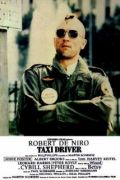
Directed by
Martin Scorsese
113 minutes
Rated R
Reviewed by
Bernard Hemingway


Taxi Driver
Synopsis: Travis Bickle (Robert De Niro) is a 26-year old ex-Marine who drives a cab all night as a means of combating insomnia. Travis is attracted to the beautiful Betsy (Cybill Shepherd), a volunteer for Senator Palantine's Presidential campaign and makes some headway with her but when he fumbles their first date and she refuses to see him any more Travis rapidly turns against the world and in particularly the "animals" and "scum" that need to be swept away by an apocalyptic act.Arguably Marty Scorsese's “masterpiece”, the combination of Paul Schrader’s script, Robert De Niro and Jodie Foster’s performance, Scorsese’s direction, Michael Chapman’s photography and Bernard Herrmann's score unquestionably makes Taxi Driver one of the iconic films of the 1970s and indeed, American cinema.
Wrongly, but perfectly understandably, the Academy of Motion Pictures Arts decided that the Best Picture that year was John Avildsen's crowd-pleaser, Rocky. "Understandably", for although Taxi Driver addresses the familiar zero-to-hero theme that is central to American culture and which Stallone’s movie tapped into, it does so in a scathingly ironic and deeply pessimistic way - not an approach likely to get Academy endorsement. Whilst Schrader’s script, with its typical preoccupation with the alienated, spiritually-lost individual, is the core of the film’s impact, everything about the production comes together superbly with, somewhat ironically, the exception of the scene in which the director himself appears.
The film tracks Bickle’s descent into darkness, both real and metaphorical, with Michael Chapman’s photography brilliantly capturing the garishly fractured reality of a decaying New York. These visuals are brilliantly complemented by Bernard Herrmann’s score (the last of his career, he died shortly after completing it). Herrmann, of course, had much experience with psychological disturbance thanks to working with Hitchcock and his hyperbolic approach reinforced the film's tone perfectly.
For most audiences, however, the most memorable aspect will be De Niro as Travis Bickle, a man who today would today be diagnosed with “post-traumatic stress disorder” but then was just a stiff struggling to adjust to “normal society”. De Niro’s "You talkin' to me?” scene, which was his own contribution, has secured itself a place in the lexicon of popular culture but this is just a highlight of his superb characterisation.
Bickle’s mental state is plugged straight into the context of urban America with its post-Vietnam disillusion and New York City in particular with its massive drug and crime problems of the time, a context cannily brought into focus in Schrader’s script by having Bickle fall for a girl (Shepherd) who is working on a Presidential nomination campaign. (Schrader was inspired to write the script after reading the published diary of Arthur Bremer, the man who was convicted of shooting presidential hopeful George Wallace in 1972).
For me Shepherd is one of the weakness of the film, not so much because of her performance but because her character is no more than a passive element (although she might be described as a “bit of a tease”) within the narrative and has no personality of her own (she is dismissed even as a motivation in the film’s epilogue). This is no doubt a function of Schrader and Scorsese’s well-documented religious upbringing and their consequent antipathetic attitude towards women (Schrader based the Bickle character on his own recent unhappy break-up with a girl). As if to confirm this, Scorsese casts himself as a cuckold whose wife has left him for a “nigger” and sits in Bickle’s cab fantasizing about shooting her in the face and “pussy”. Equally, whilst Jodie Foster, who was only fourteen years old at the time, and who was already a seasoned performer (she had appeared in Scorsese's Alice Doesn't Live Here Anymore (1974) is a marvel as the worldly-wise child prostitute, her Iris is really only a vehicle for Bickle’s messianic fantasies.
This shortcoming notwithstanding, Taxi Driver is both one of Scorsese’s finest efforts and one of De Niro’s best performances.
FYI : Apparently Schrader wrote the script with Jeff Bridges in mind as Bickle. Both Al Pacino and Dustin Hoffman were offered the role but passed. And Brian De Palma was originally hired to direct but was fired. His replacement, Scorsese brought with him his Mean Streets star, De Niro, and as they say, the rest is history. .
Want something different?





